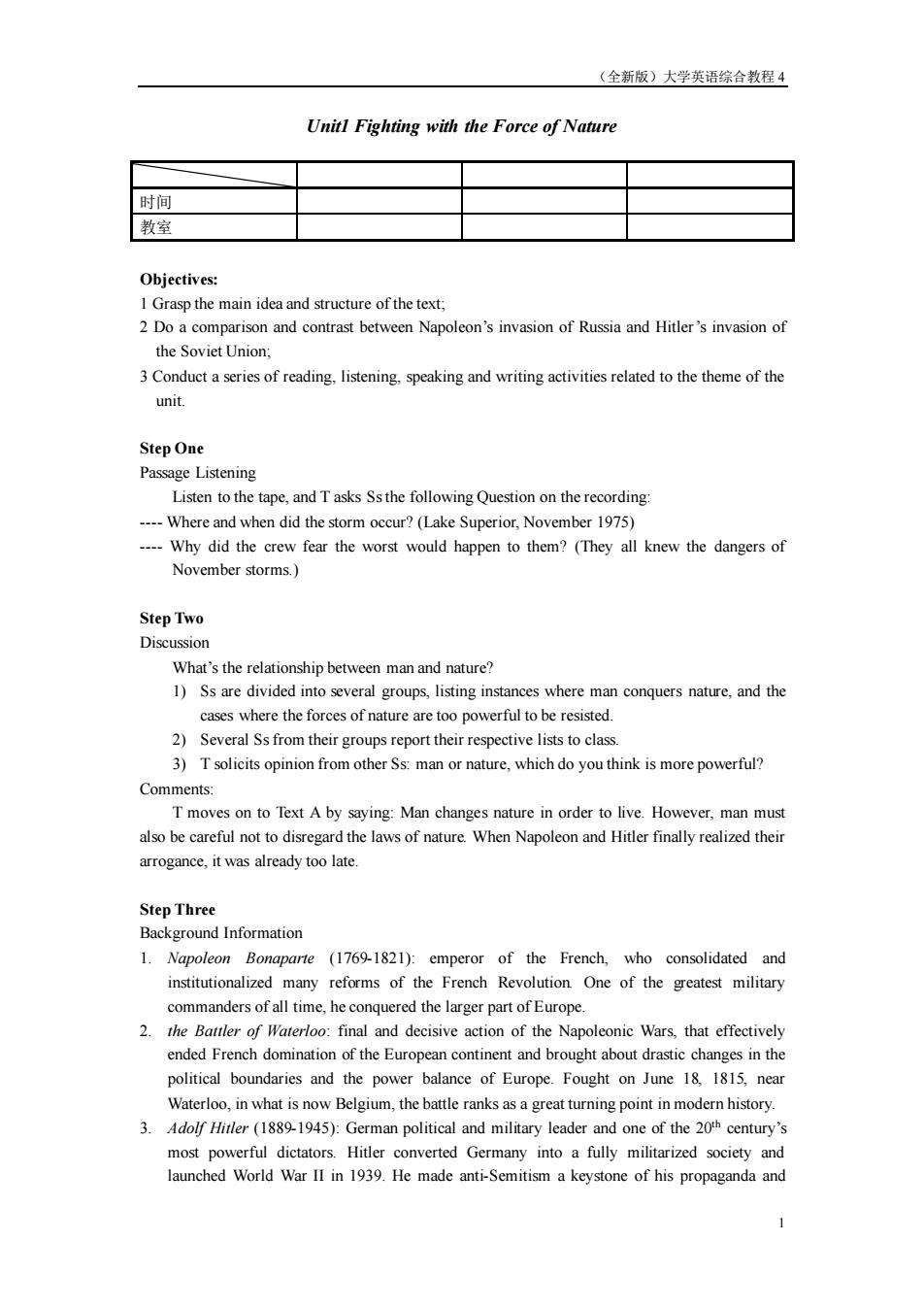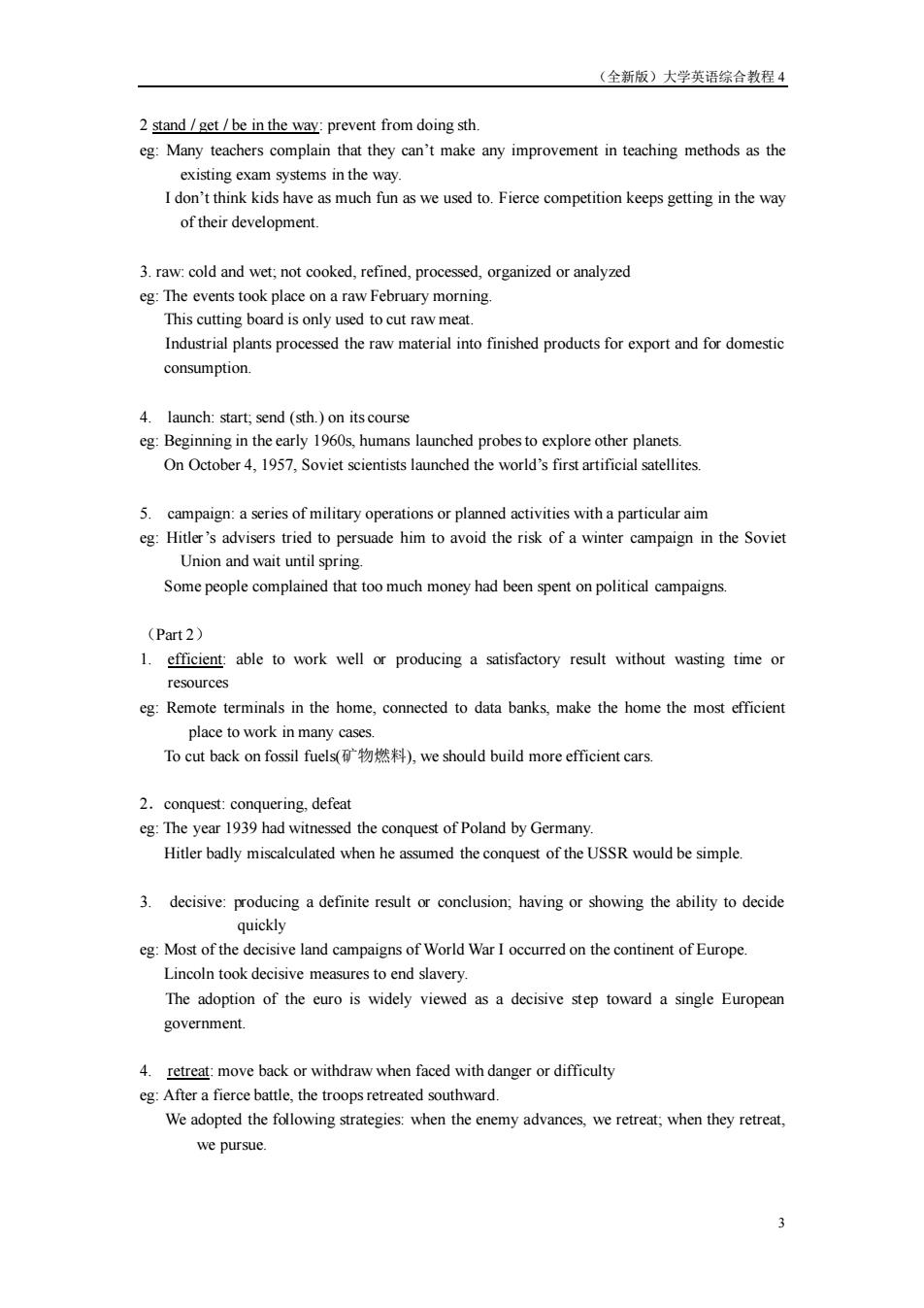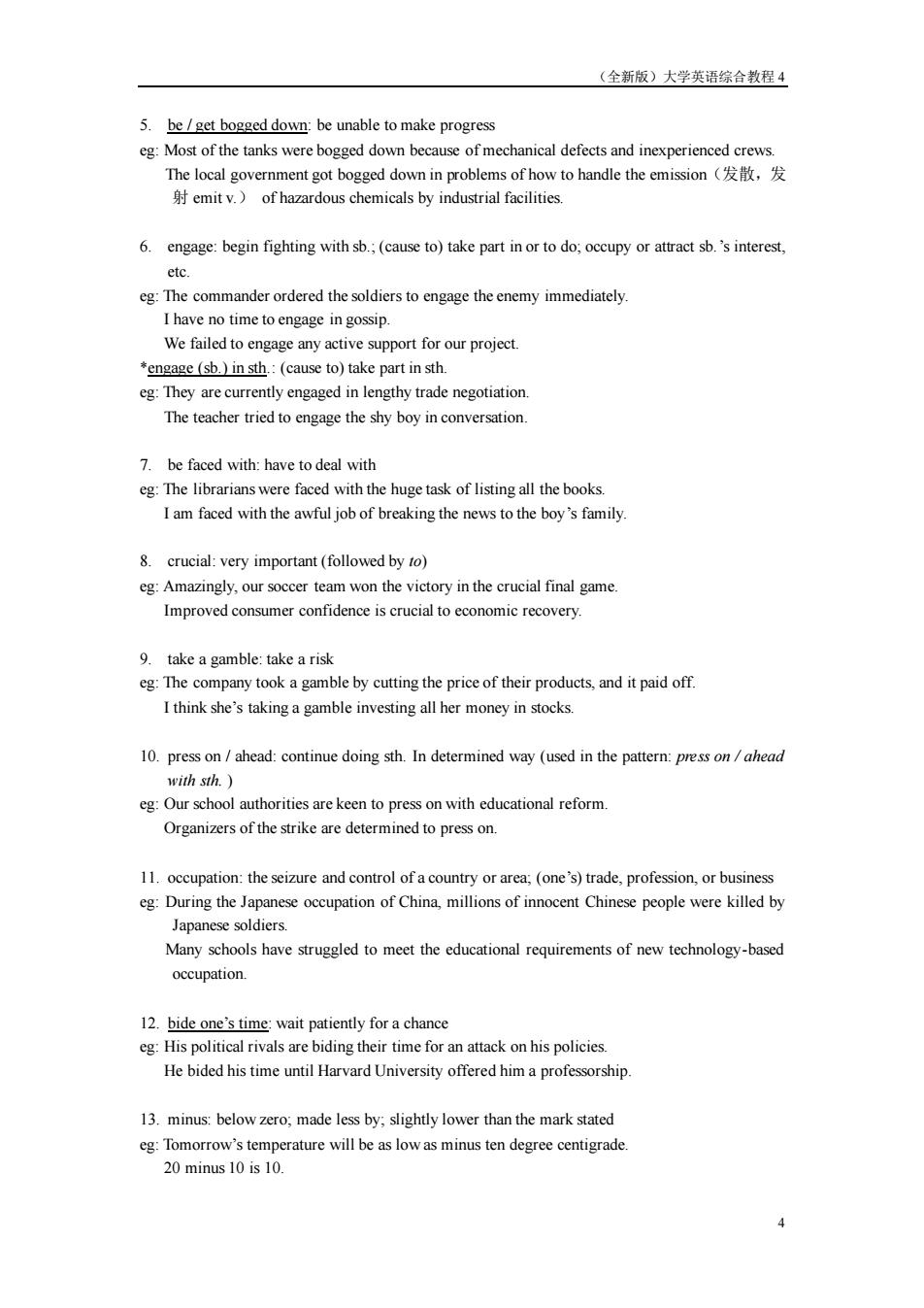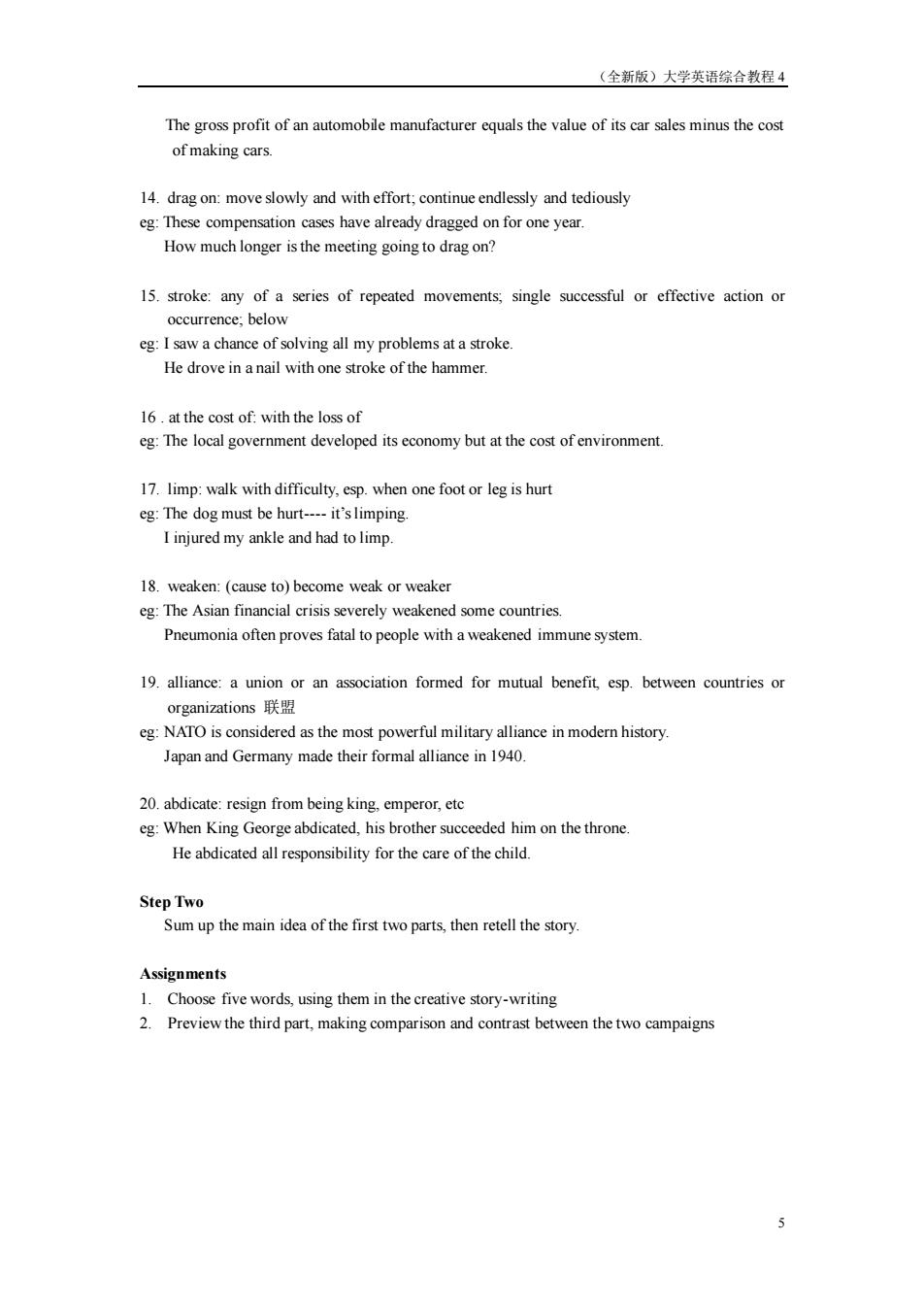
(全新版)大学英语综合教程4 Unitl Fighting with the Force of Nature 时间 Obiectives: 1 Grasp the main idea and structure of the text 2 Do a compa son and contrast between Napoleon's invasion of Russia and Hitler's invasion of the Soviet Uni 3 Conduct a series of reading.listening.speaking and writing activities related to the theme of the unit. Step one Listen to the tape,and Tasks Ssthe following Question on the recording -Where and when did the storm occur?(Lake Superior,November 1975) -Why did the crew fear the worst would happen to them?(They all knew the dangers of November storms.) StepTwo Discussion What's the relationship between man and nature? 1)Ss are divided into several groups.listing instances where man conquers nature.and the cases where the forces ofnature are too powerful to be resisted. 2)their groups report their 3)Tsolicits opinion from other Ss:man or nature,which do you think is more powerful? Comments: T moves on to Text A by saying:Man changes nature in order to live.However.man must StepThree Background Information 1.Napoleon Bonaparte (1769-1821):emperor of the French,who consolidated and yreforms of the French Revolution One of the e greatest military commanders of all time,heconquered the larger part of Europe. 2.the Battler of Waterloo:final and decisive action of the Napoleonic Wars,that effectively ended French domination of the European continent and brought about drastic changes in the political boundaries and the power balance of Europe.Fought on June 18 1815,near in what is now Belgium,the batte ranks asa great tuing 3. Adof Hitler(1889-1945):German politica and military leader andne of thecentury' most powerful dictators.Hitler converted Germany into a fully militarized society and launched World War II in 1939.He made anti-Semitism a keystone of his propaganda and 1
(全新版)大学英语综合教程 4 1 Unit1 Fighting with the Force of Nature 时间 教室 Objectives: 1 Grasp the main idea and structure of the text; 2 Do a comparison and contrast between Napoleon’s invasion of Russia and Hitler’s invasion of the Soviet Union; 3 Conduct a series of reading, listening, speaking and writing activities related to the theme of the unit. Step One Passage Listening Listen to the tape, and T asks Ss the following Question on the recording: - Where and when did the storm occur? (Lake Superior, November 1975) - Why did the crew fear the worst would happen to them? (They all knew the dangers of November storms.) Step Two Discussion What’s the relationship between man and nature? 1) Ss are divided into several groups, listing instances where man conquers nature, and the cases where the forces of nature are too powerful to be resisted. 2) Several Ss from their groups report their respective lists to class. 3) T solicits opinion from other Ss: man or nature, which do you think is more powerful? Comments: T moves on to Text A by saying: Man changes nature in order to live. However, man must also be careful not to disregard the laws of nature. When Napoleon and Hitler finally realized their arrogance, it was already too late. Step Three Background Information 1. Napoleon Bonaparte (1769-1821): emperor of the French, who consolidated and institutionalized many reforms of the French Revolution. One of the greatest military commanders of all time, he conquered the larger part of Europe. 2. the Battler of Waterloo: final and decisive action of the Napoleonic Wars, that effectively ended French domination of the European continent and brought about drastic changes in the political boundaries and the power balance of Europe. Fought on June 18, 1815, near Waterloo, in what is now Belgium, the battle ranks as a great turning point in modern history. 3. Adolf Hitler (1889-1945): German political and military leader and one of the 20th century’s most powerful dictators. Hitler converted Germany into a fully militarized society and launched World War II in 1939. He made anti-Semitism a keystone of his propaganda and

(全新版)大学英语综合教程4 policies and built the nazi party into a mass movement.He hoped to conguer the entire world. and euthanasia measures to enforce his idea of racial purity among the German people and slaughtered millions of Jews,Sinti and Roma,Slavic peoples,and many others,all of whom he considered inferior. Step Four Pronunciation Practice Thelps Ss to read the new words and phrases in the word list,and explains some word family to enlarge Ss'vocabulary.(p7) Step Five Skimming 1)Tdraws Ss'attention to the subtitles in the text,and then leads them through Text Organization Exercise 1.In this way Ss will have a better understanding of the text structure. 2)Tasks some Ss to work in groups,trying to analyze the similarities and differences between the two invasions.T may suggest that they make a comparison-and-contrast analysis of the two io inthe for m ofa ble in term invading then toreporttothe by writing their non the blackboard Assignments 1 Dictionary work:consult the dictionary and master the newly-learned vocabulary. 2Sentence transation:translate the five sentences in the first part of text 教室 Objectives .Master the key language pointsand grammatical structure in the text: 2.Retel what has been read inngish Step One Language Study (Part 1) 1.in the case of as far as eg:The rise in interest rate will be disastrous in the case of small firms. Formal training will take at least 3years in the case of interior decoration
(全新版)大学英语综合教程 4 2 policies and built the Nazi Party into a mass movement. He hoped to conquer the entire world, and for a time dominated most of Europe and much of North Africa. He instituted sterilization and euthanasia measures to enforce his idea of racial purity among the German people and slaughtered millions of Jews, Sinti and Roma, Slavic peoples, and many others, all of whom he considered inferior. Step Four Pronunciation Practice: T helps Ss to read the new words and phrases in the word list, and explains some word family to enlarge Ss’ vocabulary. (p7) Step Five Skimming 1) T draws Ss’ attention to the subtitles in the text, and then leads them through Text Organization Exercise 1. In this way Ss will have a better understanding of the text structure. 2) T asks some Ss to work in groups, trying to analyze the similarities and differences between the two invasions. T may suggest that they make a comparison-and-contrast analysis of the two invasions in the form of a table in terms of countries, time, major battles, turning point, fate of the invading force and so on, then to report to the class by writing their conclusion on the blackboard. Assignments 1 Dictionary work: consult the dictionary and master the newly-learned vocabulary. 2 Sentence translation: translate the five sentences in the first part of text. 时间 教室 Objectives 1.Master the key language points and grammatical structure in the text; 2. Retell what has been read in English Step One Language Study (Part 1) 1. in the case of: as far as . is concerned eg: The rise in interest rate will be disastrous in the case of small firms. Formal training will take at least 3years in the case of interior decoration

(全新版)大学英语综合教程4 2 stand get be in the way:prevent from doing sth. eg:Many teachers complain that they can't make any improvement in teaching methods as the existing exam systems in the way I don't think kids have as much fun as we used to.Fierce competition keeps getting in the way of their development. 3.raw:cold and wet not cookd refned,processed,organized ranalyzed This cutting board is only used to cut raw meat Industrial plants processed the raw material into finished products for export and for domestic consumption. 4. launch:(sth)onitscou eg:Beginning in the early humans launched probes to explore other planets On October 4.1957,Soviet scientists launched the world's first artificial satellites 5.campaign:a series of military operations or planned activities with a particular aim ade him to avoid the risk of a winter campaign in the Soviet Union and wait until spring Some people complained that too much money had been spent on political campaigns. (Part 2) 1.efficient:able to work well or producing a satisfactory result without wasting time o eg:Remote terminals in the home,connected to data banks,make the home the most efficien place to work in many cases. To cut back on fossil fuels(矿物燃料),we should build more efficient cars. ring,defeat eg:The year 19 had witnessed the conquest of Poland by Germany. Hitler badly miscalculated when he assumed the conquest of the USSR would be simple. 3.decisive:producing a definite result or conclusion;having or showing the ability to decide eg:Most of the dec sive land campaigns of World War I occurred on the continent of Europe Lincoln took decisive measures to end slavery. The adoption of the euro is widely viewed as a decisive step toward a single European government. 4.retrea:move back or withdraw when faced with danger or difficulty eg:Aftera fierce batte,the troops retreated southward. We adopted the following strategies:when the enemy advances,we retreat;when they retreat, we pursue. 3
(全新版)大学英语综合教程 4 3 2 stand / get / be in the way: prevent from doing sth. eg: Many teachers complain that they can’t make any improvement in teaching methods as the existing exam systems in the way. I don’t think kids have as much fun as we used to. Fierce competition keeps getting in the way of their development. 3. raw: cold and wet; not cooked, refined, processed, organized or analyzed eg: The events took place on a raw February morning. This cutting board is only used to cut raw meat. Industrial plants processed the raw material into finished products for export and for domestic consumption. 4. launch: start; send (sth.) on its course eg: Beginning in the early 1960s, humans launched probes to explore other planets. On October 4, 1957, Soviet scientists launched the world’s first artificial satellites. 5. campaign: a series of military operations or planned activities with a particular aim eg: Hitler’s advisers tried to persuade him to avoid the risk of a winter campaign in the Soviet Union and wait until spring. Some people complained that too much money had been spent on political campaigns. (Part 2) 1. efficient: able to work well or producing a satisfactory result without wasting time or resources eg: Remote terminals in the home, connected to data banks, make the home the most efficient place to work in many cases. To cut back on fossil fuels(矿物燃料), we should build more efficient cars. 2.conquest: conquering, defeat eg: The year 1939 had witnessed the conquest of Poland by Germany. Hitler badly miscalculated when he assumed the conquest of the USSR would be simple. 3. decisive: producing a definite result or conclusion; having or showing the ability to decide quickly eg: Most of the decisive land campaigns of World War I occurred on the continent of Europe. Lincoln took decisive measures to end slavery. The adoption of the euro is widely viewed as a decisive step toward a single European government. 4. retreat: move back or withdraw when faced with danger or difficulty eg: After a fierce battle, the troops retreated southward. We adopted the following strategies: when the enemy advances, we retreat; when they retreat, we pursue

(全新版)大学英语综合教程4 5.beget bogged down:be unable to make progress eg:Most of the tanks were bogged down because of mechanical defects and inexperienced The local government got bogged down in problems of how to handle the emission(发散,发 emit v.of hazardous chemicals by industrial facilities. 6.engage:begin fighting with sb.:(cause to)take part in or to do:occupy or attract sb.'s interest eg:The commander ordered to engage the enemy immediately I have no time to engage in gossip. We failed to engage any active support for our project. *engage (sb.)in sth.:(cause to)take part in sth. eg:They are engaed in lengthy trade negotiation The teacher tried to engage the shy boy in conversation 7.be faced with:have to deal with eg:The librarians were faced with the huge task of listing all the books. I am faced with the awful job of breaking the news to the boy's family 8.crucial:very important(followed by to) eg:Amazingly,our soccer team won the victory in the crucial final game. Improved consumer confidence is crucial to economic recovery. Themcungte pricoft proluct d I think she's taking a gamble investing all her money in stocks. 10.press on/ahead:continue doing sth.In determined way (used in the pattern:presson/ahead ehh.) Organizers of the strike are determined to press on. 11.occupation:the seizure and control of a country or area:(one's)trade,profession,or business eg:During the Japanese occupation of China,millions of innocent Chinese people were killed by soldi oasarenedneatecaeaoaroqacmasoorahoherha occupation. 12.bide one's time:wait patiently for a chance He bided his 13.minus:below zero;made less by,slightly lower than the mark stated eg:Tomorrow's temperature will be as low as minus ten degree centigrade 20 minus 10 is 10
(全新版)大学英语综合教程 4 4 5. be / get bogged down: be unable to make progress eg: Most of the tanks were bogged down because of mechanical defects and inexperienced crews. The local government got bogged down in problems of how to handle the emission(发散,发 射 emit v.) of hazardous chemicals by industrial facilities. 6. engage: begin fighting with sb.; (cause to) take part in or to do; occupy or attract sb.’s interest, etc. eg: The commander ordered the soldiers to engage the enemy immediately. I have no time to engage in gossip. We failed to engage any active support for our project. *engage (sb.) in sth.: (cause to) take part in sth. eg: They are currently engaged in lengthy trade negotiation. The teacher tried to engage the shy boy in conversation. 7. be faced with: have to deal with eg: The librarians were faced with the huge task of listing all the books. I am faced with the awful job of breaking the news to the boy’s family. 8. crucial: very important (followed by to) eg: Amazingly, our soccer team won the victory in the crucial final game. Improved consumer confidence is crucial to economic recovery. 9. take a gamble: take a risk eg: The company took a gamble by cutting the price of their products, and it paid off. I think she’s taking a gamble investing all her money in stocks. 10. press on / ahead: continue doing sth. In determined way (used in the pattern: press on / ahead with sth. ) eg: Our school authorities are keen to press on with educational reform. Organizers of the strike are determined to press on. 11. occupation: the seizure and control of a country or area; (one’s) trade, profession, or business eg: During the Japanese occupation of China, millions of innocent Chinese people were killed by Japanese soldiers. Many schools have struggled to meet the educational requirements of new technology-based occupation. 12. bide one’s time: wait patiently for a chance eg: His political rivals are biding their time for an attack on his policies. He bided his time until Harvard University offered him a professorship. 13. minus: below zero; made less by; slightly lower than the mark stated eg: Tomorrow’s temperature will be as low as minus ten degree centigrade. 20 minus 10 is 10

(全新版)大学英语综合教程4 The gross profit of an automobile manufacturer equals the value of its car sales minus the cost of making cars 14.dragon:move slowly and with effort:continue endlessly and tediously eg:These compensation cases have already dragged on for one year. How much longer is the meeting going to drag on? 15.stroke:any of a series of repeated movements,single successful or effective actiono occurrence,below eg:I saw a chance of solving all my problems at a stroke. He drove in anail with one stroke of the hammer. eost of with the loss of eg:The local government developed its economy but at the cost of environment 17.limp:walk with difficulty,esp.when one foot or leg is hurt eg:The dog must be hurt-it's limping. Iinjured my ankle and had tolimp 18.weaken:(cause to)become weak or weaker eg:The Asian financial crisis severely weakened some countries. Pneumonia often proves fatal to people with a weakened immune system 19.alliance:a union or an association formed for mutual benefit esp.between countrieso organizations联盟 eg:NATO is considered as the most powerful military alliance in modern history. Japan and Germany made their formal alliance in 1940. 20.abdicate:resign from being mperor,ete eg:When King George abdicated,his brother succeeded him on the throne He abdicated all responsibility for the care of the child. Step Two Sum up the main idea of the first two parts,then retell the story Assignments 1.Choose five words,using them in the creative story-writing 2.Preview the third part,making comparison and contrast between the two campaigns
(全新版)大学英语综合教程 4 5 The gross profit of an automobile manufacturer equals the value of its car sales minus the cost of making cars. 14. drag on: move slowly and with effort; continue endlessly and tediously eg: These compensation cases have already dragged on for one year. How much longer is the meeting going to drag on? 15. stroke: any of a series of repeated movements; single successful or effective action or occurrence; below eg: I saw a chance of solving all my problems at a stroke. He drove in a nail with one stroke of the hammer. 16 . at the cost of: with the loss of eg: The local government developed its economy but at the cost of environment. 17. limp: walk with difficulty, esp. when one foot or leg is hurt eg: The dog must be hurt- it’s limping. I injured my ankle and had to limp. 18. weaken: (cause to) become weak or weaker eg: The Asian financial crisis severely weakened some countries. Pneumonia often proves fatal to people with a weakened immune system. 19. alliance: a union or an association formed for mutual benefit, esp. between countries or organizations 联盟 eg: NATO is considered as the most powerful military alliance in modern history. Japan and Germany made their formal alliance in 1940. 20. abdicate: resign from being king, emperor, etc eg: When King George abdicated, his brother succeeded him on the throne. He abdicated all responsibility for the care of the child. Step Two Sum up the main idea of the first two parts, then retell the story. Assignments 1. Choose five words, using them in the creative story-writing 2. Preview the third part, making comparison and contrast between the two campaigns